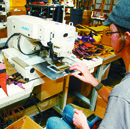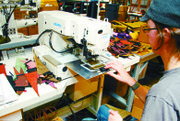Urban Manufacturing Alliance: Bringing Manufacturing Back to the City
With many U.S. manufacturing hubs having fallen victim to the volatile economy and companies outsourcing to foreign countries, Kate Sofis, founding executive director for San Francisco nonprofit SFMade, is helping launch the Urban Manufacturing Alliance, a new initiative to help develop manufacturing in cities across the United States. The program aims to strengthen apparel and other types of manufacturing, as well as provide leadership and resources in the field.“The goal is to build a national network of major U.S. cities with inner-city manufacturing capability,” Sofis explained. “Over time, this will include both cities well-known for their manufacturing sectors—cities like Detroit; Chicago; Newark, [N.J.]; Pittsburgh; and L.A.—as well as cities where local manufacturing might be one of their better-kept secrets, including San Francisco.”
The program has been launched in partnership with the Pratt Center for Community Development in Brooklyn, N.Y., and will be modeled after SFMade’s approach to encouraging and integrating urban manufacturing.“With San Francisco, for the apparel sector, we have in-house expertise in that industry, and we’re connecting manufacturers to designers,” Sofis said. “By comparison, with food manufacturing, we’re doing things like helping companies finance equipment and dealing with health codes. We tailor the work to each industry.”San Francisco and New York will be the first two cities to participate in the alliance, but the program is actively looking for more cities to take part. After receiving recognition from President Clinton at the Clinton Global Initiative conference in June, they have been approached by Seattle, Portland, San Diego, Chicago, Detroit, Newark, Cleveland, Atlanta and Philadelphia—and even from abroad, by Copenhagen, Denmark; Sydney; Melbourne; Bergen, Norway; and Cambridge, England.The alliance will provide support on everything from branding to finding physical space and skilled laborers and aims to work within the strengths of each city rather than on bringing in manufacturing from the outside.“We’re not taking the approach of attracting manufacturing. Each city needs to look into what is already there and build on it,” Sofis said. “Let’s see what kinds of businesses are trying to start there, and let’s try to help them grow.”In addition to providing knowledge and local resources, the initiative will focus on connecting cities with one another, whether for suppliers or fellowship.“There is so much [apparel manufacturing] strength in L.A., and we have San Francisco designers with connections in L.A. Why wouldn’t you want to reinforce that?” she said. “San Francisco has lots of shoe designers, and they need manufacturing, but there’s no shoe manufacturing in San Francisco, and we know that there’s capacity in L.A.”Sofis said the program eventually hopes to have a database where information such as this would be stored. “We would like to see the ability for urban manufacturing centers to have an easy way to access the supply base for that city.”The program will be open to all cities and will aim to represent a variety of sectors and geographies.“In some of the really expensive U.S. cities, like New York, people imagine there’s no manufacturing left,” Sofis said. “They are well aware of Brooklyn, but most people don’t think there’s much going on in Manhattan. There actually is—there’s the garment district, metal working, silver making, jewelry making, bag making—but it’s primarily smaller scale. Cities with high-priced real estate and higher competition have a hard time sustaining larger manufacturers, so there are more medium or small manufacturers.”Many Americans think of the “rust belt” cities—such as Pittsburgh, Cleveland and Buffalo, N.Y.—as having a manufacturing past and being economically challenged. However, these cities have experienced a renaissance of smaller-scale manufacturing that sometimes has to do with their past and sometimes has nothing to do with it, explained Sofis.“Each city needs to think about what it has going for it and really hone that,” Sofis said.One of the challenges facing American companies is finding workers that have the existing technical and physical skills required in manufacturing, Sofis explained.“We’re not doing a great job in the U.S. of developing vocational skills and training programs. There’s not a lot of people with excellent sewing skills or chocolate-making skills,” she said. “One of the things that L.A. has going for it is this incredible monopoly of immigrant communities. Most cities don’t have that diversity of people with real skills coming from other parts of the world, particularly in sewing or metal working or beading. It gives L.A. and that area an advantage.”Sofis hopes that the program will also help change the perception of manufacturing and highlight career possibilities.“We’ve let the perception of manufacturing devolve into huge union jobs or that they’ve all gone overseas. We’re not inspiring the next generation of young people,” she said.The alliance hopes to expose a new view of manufacturing, including highlighting what a career in a modern manufacturing company might look like through factory tours and a youth apprenticeship program.“There are highly creative jobs and a lot of advancement potential,” Sofis said. “Even a skilled sewer gets to collaborate on design and work with teams on a finished product.”While SFMade is a charter organization in the Urban Manufacturing Alliance, it will be an “alliance of equals,” and each city would comprise an independent initiative, Sofis said.“We’re hoping to inspire other cities who may not be as focused on their own manufacturing to do so,” she explained. “There is something very special about doing manufacturing in dense, urban cities. We think we’ve been missing the power that cities in particular have to make products in innovative ways.”























